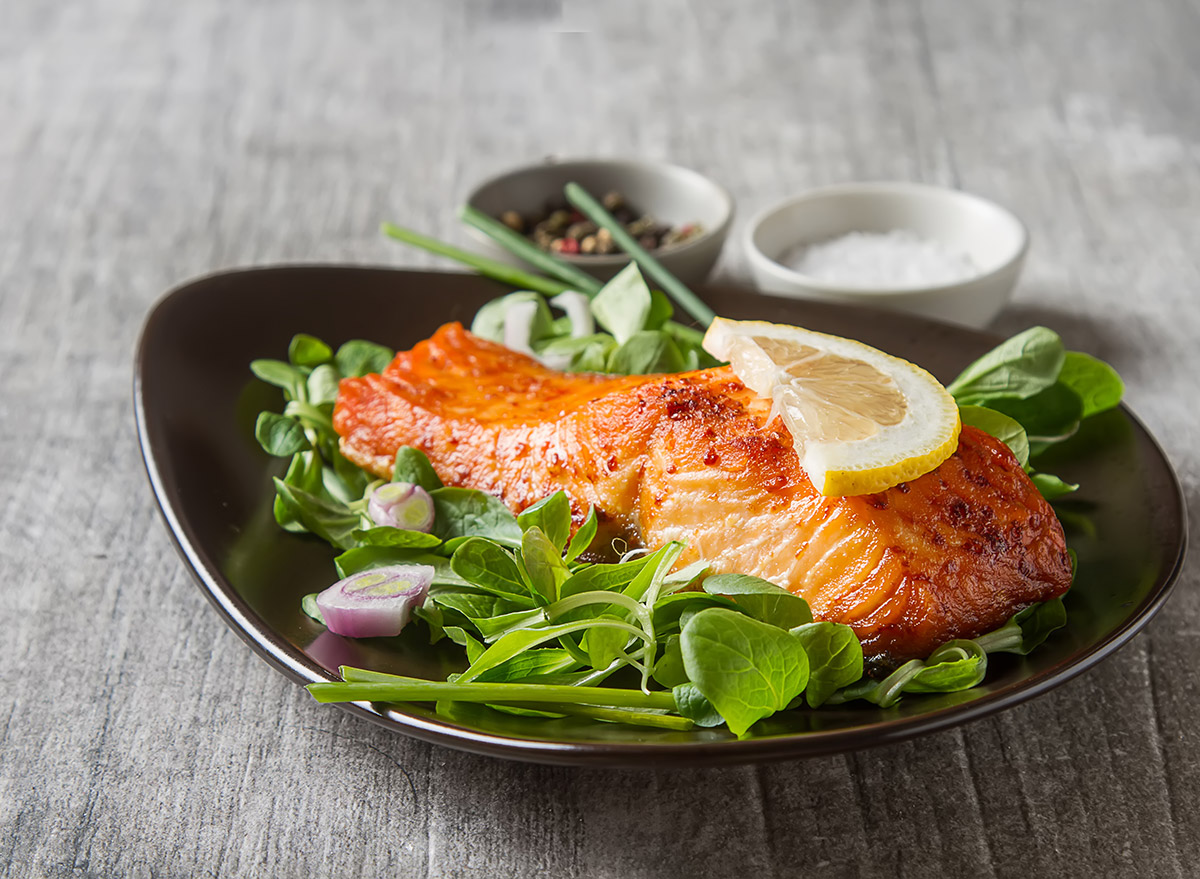The risk of polyp of the vagina was reduced by 33% by legumes (beans) and by 40% by brown rice incorporated into the diet.

There may have been a time when you ate whatever you wanted without few, if any, health consequences. You might remember that time well! But it's true—nothing lasts forever.
"After 50, metabolism slows, estrogen levels drop, and certain nutrient requirements rise," says Hillary M. Wright, MEd, RDN, LDN, co-author of The Menopause Diet Plan, A Natural Guide to Hormones, Health, and Happiness. "At this point, you'll probably need to make wiser food choices to help head off midlife weight gain and prevent conditions that are more common with age and menopause."
Though no food is ever completely off the menu, the trick is to get the biggest bang for your caloric buck while enjoying yourself. Here's what to choose, and avoid, most of the time, for women over the age of 50. And for more, check out The 7 Healthiest Foods to Eat Right Now.
First up, here are the best foods to eat.
Salmon

Calorie needs decline with age, but weight gain isn't inevitable. Salmon is a stellar source of protein, which requires more calories to digest than carbohydrates and fat and could help prevent the dreaded belly fat that is common in midlife women. The omega‑3 fats in salmon are good for your heart and brain because they reduce the risk for clogged arteries, decrease elevated triglycerides (fat) in the blood, and lower blood pressure, all of which tend to increase in women in their 50s.
Fish such as salmon may also boost your mood. Eating more fish is associated with a decreased risk of depression, which is more common in women at midlife. Salmon also harbors vitamin D, a nutrient that is key in helping to prevent osteoporosis. Three ounces of cooked sockeye salmon nutrients has nearly all the vitamin D you need for the day after age 50.
Nuts

"For their small size, nuts contain relatively high levels of calories and fat, so you may think that avoiding them will help whittle your waistline, but the opposite is more likely to be true," Wright says.
Research has found that eating nuts actually help regulate appetite which could make weight control easier. Nuts supply plant protein, heart-healthy, unsaturated fat, potassium, fiber, and other nutrients linked to good health as you age. In fact, women who munched on 1 1/2 ounces of pistachios for 12 weeks improved the quality of their diet without affecting their weight.
When you include delicious and nutritious nuts on a regular basis, you're doing your heart and brain a favor. Nuts are rich in arginine, an amino acid necessary for making nitric oxide, which eases blood flow to the heart and the brain by relaxing constricted blood vessels. Get the greatest benefit from nuts by swapping 1/4 cup of unsalted varieties such as peanuts, almonds, walnuts, and pistachios (shell on) for snack chips, pretzels, and sweets.
Berries

When it comes to banishing brain fog and protecting your memory after 50, it pays to squelch oxidation and inflammation. Berries supply many different types of powerful compounds called phytonutrients that help to head off brain cell damage and improve or increase communication between cells, among other ways of supporting brain function.
Blueberries, strawberries, raspberries, and other brightly-colored orbs are juicy and delicious without any added sugar. So these fruits can easily take the place of highly-processed, calorie-packed sweets that will actually provide you with some fiber to keep you fuller for longer. Blueberries and blackberries are also a source of vitamin K, which is necessary to produce osteocalcin, a protein that supports bone strength. Some research suggests that higher intakes of vitamin K are linked to better bone health in older women.
Looking for more helpful tips? Sign up for our newsletter to get daily recipes and food news in your inbox!
Legumes

Legumes such as black beans, garbanzo beans, and pinto beans contain magnesium to help protect against heart disease, stroke, type 2 diabetes, and osteoporosis. Beans are packed with potassium, which is great news for your ticker, as it's linked to a lower risk for cardiovascular disease. One half-cup of black beans supplies about 400 milligrams of potassium—nearly as much as a medium banana, and about 15% of the recommended daily intake.
Beneficial bacteria in your colon ferment the prebiotic fiber found in beans and produce compounds called short chain fatty acids (SCFA). SCFA help reduce the risk for colon cancer, which increases after age 50, improve the body's absorption of calcium and magnesium to support bone health, and help to head off heart disease and type 2 diabetes. Another type of fiber in beans bulks up bowel movements and prevents constipation, which can be more common with age.
Soy

Declining estrogen levels are likely the reason for hot flashes, which affect about 75% of women living in the U.S. for at least two years in their 40s and 50s. Soy foods contain phytoestrogens, plant-based estrogen that is similar in function to human estrogen, but with much weaker effects in the body.
"Women who eat soy every day, including those who live in Asian countries, report having fewer hot flashes and other menopausal symptoms, but there is no scientific evidence to support the link between tofu, tempeh, and edamame and hot flash frequency and intensity," Wright says.
Still, there are plenty of reasons to include soy foods in a balanced eating plan at any stage of life. Soy is a source of complete protein, and it's a suitable substitute for fatty and processed meats. Plus, soy is also heart-healthy. Eating 25 grams of soy protein daily, about the amount found in 1/2 cup roasted soy nuts and 1 cup unsweetened soy milk, actually reduces LDL ("bad") cholesterol, which helps lower heart disease risk. As an added bonus, tofu that's processed with calcium offers a significant amount bone-building calcium, and tempeh and soybeans pack fiber.
Plain Yogurt

Yogurt is a mixture of milk and live active cultures (LAC), also known as probiotics, which are live organisms that help promote gut health by populating the colon with beneficial bacteria. The Live & Active Cultures seal from the National Yogurt Association denotes yogurt with the most LAC. Yogurt is also packed with protein that burns more calories and keeps you fuller for longer. In addition to possibly protecting against midlife weight gain, regular intake of yogurt with LAC may help promote healthier blood pressure and head off type 2 diabetes.
Yogurt also offers protein and calcium to support bone health. After age 50, suggested calcium intakes increase to 1,200 milligrams a day. A cup of plain regular yogurt supplies about 448 milligrams of calcium. Avoid sugary fruit-flavored yogurt in favor of plain yogurt mixed with berries for more protein, fiber, vitamins, and minerals, and no added sugar.
Is it healthy to eat sperm?
Mostly, yes, the components that make up semen are safe to ingest. When swallowed, semen is digested in the same way food is.
There are some people who are allergic to sperm, a condition called human seminal plasma hypersensitivity (HSP). It's a very rare allergy where individuals are hypersensitive to the proteins found in semen. It affects around 40,000 women in the US.
The alleged health benefits of seminal plasma are believed to be activated when a man deposits semen into a woman's vagina, but research suggests that the same benefits may also be available if it is swallowed (and some theories even suggest that semen deposited anally will offer the same benefits).
10 Possible Health Benefits Of Swallowing Semen
1. Semen is a natural antidepressant.
Studies have shown that semen elevates your mood and even reduces suicidal thoughts. According to a 2002 study, women who were exposed to semen had a consistently better overall mood and were less susceptible to depression.
2. Semen may reduce anxiety.
According to a 2009 study, semen boasts anti-anxiety hormones like oxytocin, serotonin, and progesterone.
The driving force of anxiety is oxidative stress and semen actually contains several combative antioxidants. Having these antioxidants makes semen a prime warrior against anxiety.
3. Semen can improve the quality of your sleep.
Semen contains melatonin, a sleep-inducing agent.
A 2015 study that looked at the relationship of seminal melatonin concluded, "Semen contains melatonin, the natural hormone your body releases to regulate sleep cycles. This explains why people feel tired after swallowing semen or being exposed to it during intercourse."
Our body's natural reaction is to absorb the nutrients we ingest, so when swallowing semen, it's like taking a melatonin pill for the night. The same goes for your vaginal lining, which also absorbs semen.
4. Semen can boost energy.
And it's even been shown to improve cardio health.
A 2016 study found that "high levels of dietary spermidine [which is found in semen], as assessed from food questionnaires, correlated with reduced blood pressure and a lower incidence of cardiovascular disease."
5. Swallowing semen may prevent preeclampsia.
Preeclampsia is a condition that causes dangerously high blood pressure during pregnancy. A 2000 study suggested that "swallowing sperm is correlated with a diminished occurrence of preeclampsia."
The study looked at an isolated peptide called HLA, which has the ability to transfer tolerance. Soluble HLAHLA antigens that are present in the seminal plasma can cause tolerance in the mother to paternal antigens that cause preeclampsia during pregnancy.
6. Semen may improve memory.
Based on a 2019 study, the findings are clear: semen actually improves your memory.
In the study, researchers looked at a seminal peptide that affected the female memory and demonstrated that this "sex peptide enhances memory by acting on a single pair of serotonergic brain neurons"
Their result was that semen had a strong effect on the female brain. However, this was just done on fruit flies, so more research is needed to to further verify if it also works on other organisms.
7. Semen may improve mental alertness.
Findings of additional studies "suggest that semen-exposed women perform better on concentration and cognitive tasks."
8. Semen may be good for your skin.
A 2009 study showed that semen may slow down the aging process of your skin and muscles. Semen contains a healthy portion of zinc, which is an antioxidant — and some have even tried semen facials, though word is still out on whether or not that actually works (more on that below).
9. Semen can be a pain reliever.
Impressed? You should be! Nature knows what she's doing!
Some of the helpful chemicals in seminal plasma include testosterone, estrogen, prolactin, opioid peptides, oxytocin, serotonin, melatonin, and norepinephrine. Just think, you can get a dose of all that without having to go to the vitamin store!
10. Semen may prevent morning sickness.
Psychologist Gordon Gallup said that the best thing to cure morning sickness is ingesting the semen of the same person who got you pregnant. He explains that "the more often the woman is inseminated prior to conception and during the early stages of the pregnancy, the more tolerance her body develops to his genetic material."
This results in the woman's development of a successful immunosuppressant, which inherently stops stomach problems, making her vomit on command.






















Commenti
Posta un commento